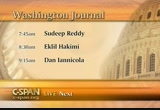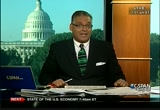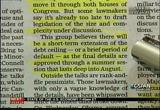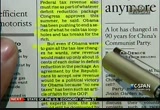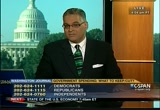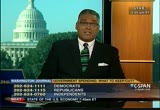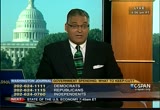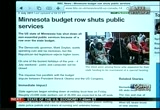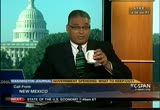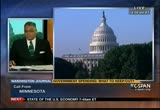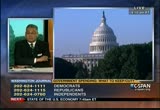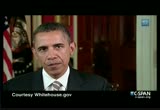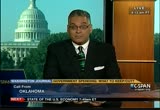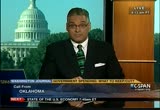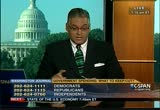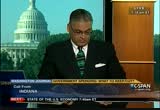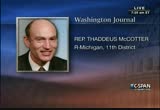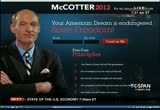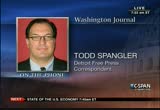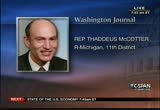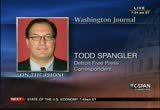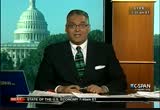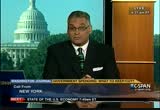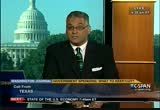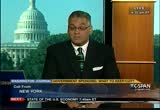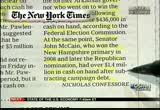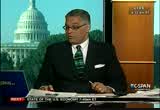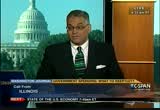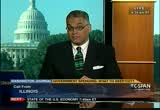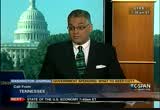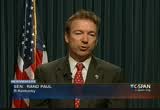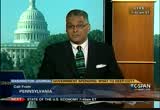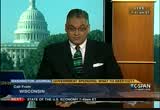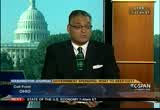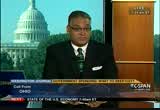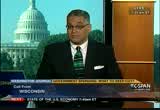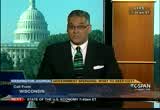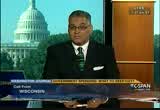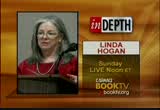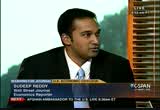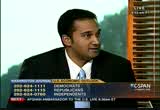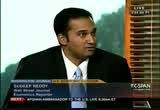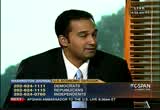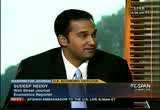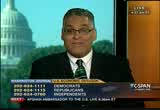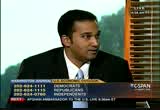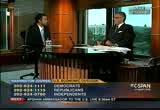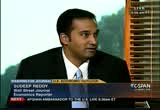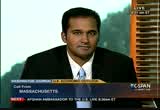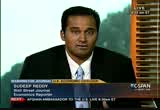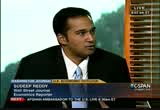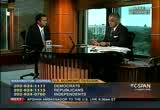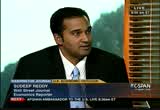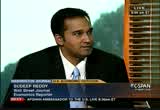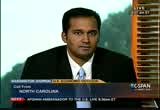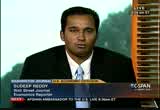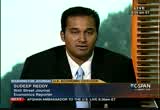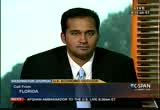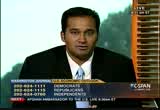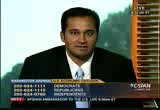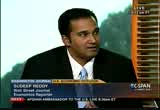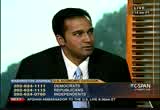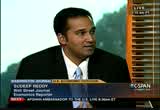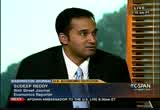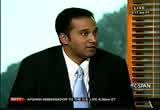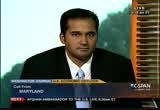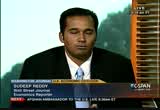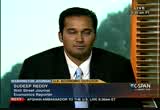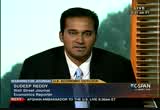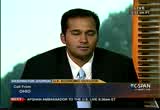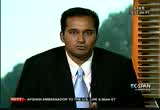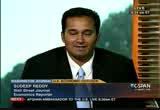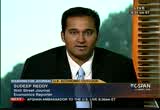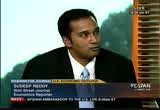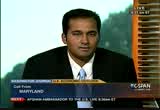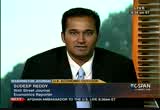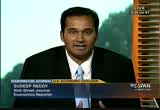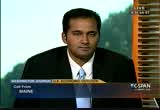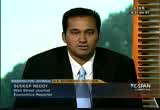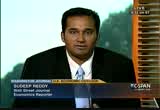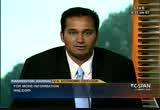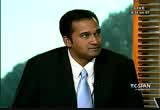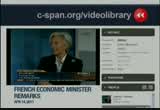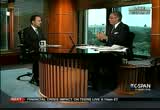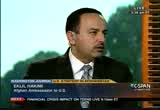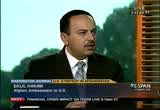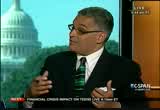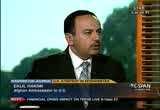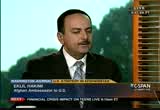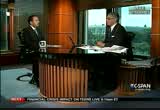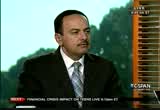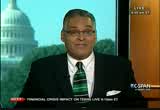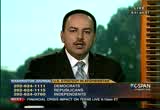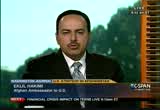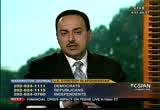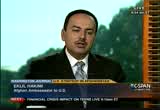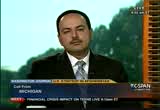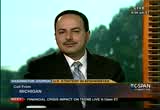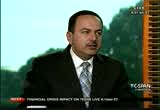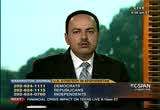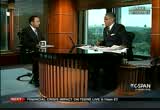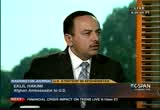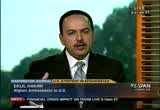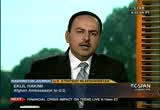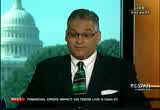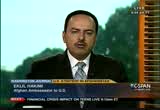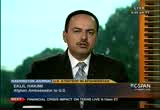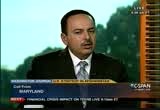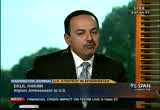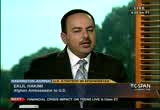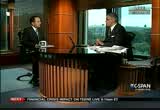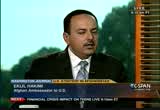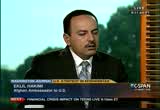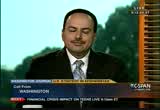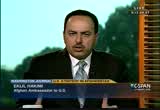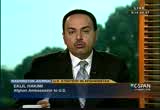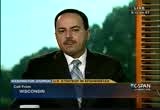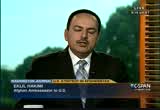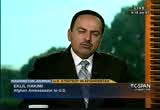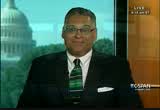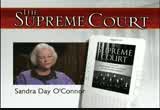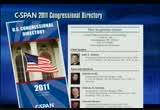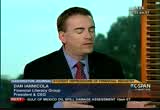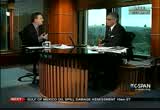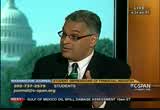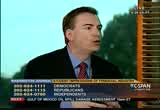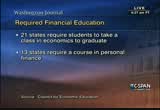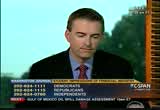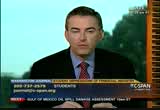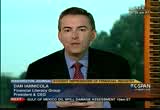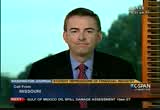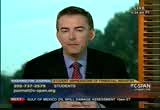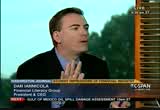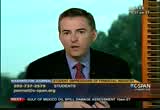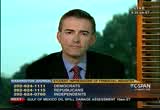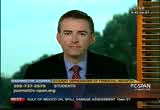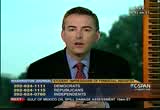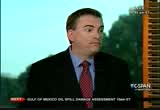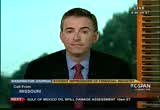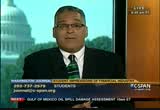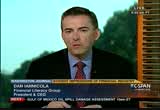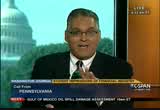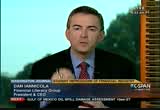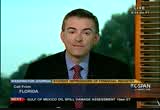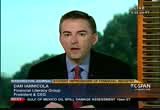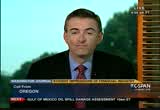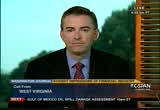tv Washington Journal CSPAN July 2, 2011 7:00am-10:00am EDT
7:04 am
7:05 am
caller: we will have to cut spending not raise taxes. at least, 10% across the board cuts in all of the agencies. what we need to do mainly is we have to elect people like mitt romney that know how to cut spending. our congressmen avoids the cap -- cutting spending. the department of education -- sillimanite -- eliminate those. host: why those? >> education should be a local and state matter. i do not think the department of education is needed. the answer is cutting federal
7:06 am
spending. that is the key. host: democrats line, minnesota. caller: as i was listening to the program, i heard about budget cutting. i think -- the democrats and republicans need to work together. we need to get our young folks back in school. [unintelligible] we have to work together. if we keep talking about cutting, what are we cutting back you cannot cut education. america is the no. 1 country in the world. we need education.
7:07 am
host: what do you do as far as how we resolve other spending in the federal government? caller: cover representatives are the problem. next year i will be working for the first time. [unintelligible] the republicans have said nothing but a note to president obama. host: the story is coming out of your state with a shutdown because republicans and democrats could not come together on spending issues. caller: this is an upper biggest
7:08 am
problem. we are left with a big deficit. all they talk about is cutting. -- host: we will have to leave it there. when it comes to government spending issues are concerned, that is what we are weighing in right now. good morning, james, independent line. caller: 5 believe the oil companies and big businesses should pay their fair share. republicans are nothing but a bunch of lawyers. they have -- lawyers. -- liars.
7:09 am
they have been line ever since george bush was in there. host: what kind of spending and programs are you talking about? caller: all of their subsidies and not paying any taxes. host: we will leave it there. please turn down your television sets when you call in. florida, this is a comment from twitter. another call from minnesota this morning, what to cut what to keep? caller: i am a republican. it is hard to hear that we are the party of no, no, no. at the federal level, of our government has shut down because they cannot come together. republican-led states that do not have cannot of raising of
7:10 am
taxes, the states are not in a deficit and not in a shutdown. we do need to possibly raise revenues. across the board, only 50% population pays any federal taxes at all. if you want to talk about shared sacrifices, go across the board for revenues as well. if everybody has a fair share in something, you have a fair share of wanting to have input on where the money goes. if 50% of the population pays no taxes, they will not care if taxes are raised on the other half. host: is this going to be a short term as far as the cutting of programs?
7:11 am
caller: it could go into the summer, which worries me. we have a democratic governor with a republican-led congress here. we are at the point where republicans say no raising taxes and someone refuses anything unless there is an increase in taxes. as a republican, it is hard, because it does not make sense to me to raise taxes, because it can cause job loss. i do not understand that premise at this time right now. host: i will leave it there. the president weighed in on this topic the weekly address that he makes. you can find it on the internet
7:12 am
as well. >> the government test to start living within its means just like families. we have to cut the spending we cannot afford so we can put the economy on sound footing and give businesses the company as they need to grow and create jobs. over the last few weeks, the vice president and i have gotten both parties to identify more than $1 trillion in spending cuts. after a decade in which washington ran up the country's credit cards, we have to find more savings to get out of the red. that means looking at every program can't tax break in the budget to find places to cut waste and save money. host: our next call is oklahoma city, patrick on average democrats line. caller: as a 54-year-old, son of
7:13 am
immigrants, i find myself moving away from my party position. i cannot embrace the republican position, but i think what we are faced with is it will be a shoot out at the o.k. corral with the democrats taking their position and republicans taking their position. [inaudible] host: you broke up a little, but keep going. caller: these oil companies have to pay their fair share. in order for this government to get around, we have to tighten
7:14 am
up spending. we have to stimulate growth. giving oil companies more tax breaks and generating more jobs which new jobs are generated by small business. host: is that your main concern or are there others? caller: it is across the board, big business. those that have a small manufacturing company that employs 50 people, is he getting the same tax breaks as the oil company? host: on the new york post papers, a special election for weiner's seat.
7:16 am
. >> we don't believe the tax code did work. >> that's why we are in a big, big, big mess right now. >> i singed out tax programs so programs wouldn't be cut in your opinion? >> i think they should. let's start with the ones that don't pay anything. and then go on to the others. because, you know, i am not a big program person, but there are some programs that are needed. and i think we need to start with all of the people that don't pay taxes and get all of these subsidies and then go on
7:17 am
to the programs. >> a couple of stories dealing with members of congress. this from the "daily news" that the house ethics schmitt announced for the first time yesterday it is represent can gregory meeks for possible ethics violations. under a federal investigation that focuses at least in part on a 40,000 dollar loan he received from a queens businessman as the daily news previously reported, he failed to file disclosure loans for two years. paid it back when the f.b.i. started asking questions. it is unclear if the inquiry is related to the loan. also, the stories this morning, this is off of cincinnati.com, that the house ethics schmitt announced friday it is investigating gene submit who has been accused of receiving thousands of dollars from a turkish american group. it doesn't mean that the schmitt found any wrongdoing. a schmitt accusing him of
7:18 am
accepting free legal services from the turkish american group had been filed earlier with the office of congressional ethics which serves as a clearing house for all cases. friday's statement means the oce has passed the complaint onto the ethics schmitt. the schmitt is required to announce whether an investigation is being extended beyond 45 days, from cincinnati.com this morning. indianapolis, indiana, nancy asking people what would you keep? what would you cut? nancy, with that in mind, go ahead. caller: everybody has expressed my opinion about how the big businesses and how the oil companies and it seems like the middle class people are paying more at the grocery store, more at the pump, more at everything. and there is no jobs coming. all of these corporations are hiding money. i think somebody said like 4$400 -- billions of dollars set
7:19 am
offshore, holding onto the money. if you come home to compete with china and all of the other countries coming up, we are becoming the second-class nation. we really are. we can't manufacture a wash cloth, a towel, utensils things that were made in this country, made this country great and they won't come home and put this money together. it's called greed. we are putting everything in the federal government's lap. we are letting them hide and just like the oil companies, brag about what they are making. >> if you just target the oil companies, will that resolve the problem in your mind as far as spending is concerned? caller: i think we tax them or they come home and stimulate jobs. i don't care if it's manufacturing. i think we need to start at the core values of how do these people expect to make money off of americans when they don't have money? they bayl they barely have mone buy food, gas. if you tax the oil companies and some of these big
7:20 am
corporations -- and i think small businesses should be tax exempt with so many people. you create more manufacturing jobs, more jobs in this country. i don't care if you make light bulbs or screws or screw drivers or whatever. those companies can eventually start paying more taxes and the people who make money pay taxes, and then they can afford healthcare which would solve a huge, huge problem. >> we will leave it there off of twitter this morning, this is a tweet from jim frye who says that one area we should not cut is education, low-income housing, the wic program, unemployment, social security, and he goes on with a couple of other things. but that's off of twitter this morning. so for the remainder of our time, we will continue on with this question, but we do want to take a few minutes to talk about an announcement in the presidential field that was made yesterday. >> that's michigan's thaddeus mccotter who announced yesterday
7:21 am
he is going to file and he has filed paperwork to run with the federal election commission to run for president. the story this morning is filed in the "detroit free press." his two-year term in the house is a believer in free markets and smaller government and joining us to tell us a little bit more, to give us more information about mr. mccotter and his intentions is tom spangler from the "detroit free press" serves as a core respondence. mr. spangler, why mr. mccotter and why the entering the race? >> i think he is entering the place. i take him at his word. i think he is in the race because he sees a gap with the current field of candidates that he can fill with his conservative principles. >> as far as name recognition, usually that goes a long way in these kind of races. has he expressed thoughts on his ability to compete with the others in the field? >> well, he's expressed he realizes the difficulty of competing in this content given
7:22 am
his low-name recognition and the other hand, you know, he is going to bring to the race. he is in this because congressman mccotter likes to extemporize ol republican principles and wants to do that on the biggest stage possible to see if people react to his ideas. i think he believes if he gets a chance to be heard, the other stuff will take care of itself. >> i talked about ideas. can you give us a sense of where he falls? what is usually in most people's minds is economics. what kind of principles does he espouse? >> they would fall, i would say, along the lines of a lot of conservative candidates and tea party thoughts in terms of smaller government, lower taxes, and a government that sort of is built for business to succeed. at the same time, he will talk about workers. he has some labor leanings. his dad was a truman democrat, a
7:23 am
union member. you know, he has worked with labor before, made some labor votes. he thinks there is room for management management and labor to come together. family values, he is anti-abortion. and a roman catholic. you know, he falls along those lines. he talks about a very disciplined sort of conservatism that will he is about. >> with some of those labor issues you have brought up, does he have concern from those who watch his campaign that he is not conservative enough because he has made those specific moves on labor decisions? >> when i talked to congressman mccot ter about this and his people about this, the key value here for them is that i don't think they care whether or not some people are going to disagree with him. it becomes very, very clear the
7:24 am
way they feel about this is that he has a set of principles and he wants to talk about what those principles are and he's said it before. he expects to be reviled in some quarters and he is perfectly okay with that. >> talk about his ability to raise funds and, also, has he expressed or at least his team expressed anything about ground campaigns in such battlegrond states as iowa new hampshire? >> heur. once he starts talking and congressman mccotter has a rye, sardonic wit. he is cerebral, a lot of $2 words but it comes across like he knows what he is talking about, that he is very intelligent about it, that once he starts talking that way, money will flow in and other than a candidate like romney, a lot of people on the republican side are having trouble raising money anyway, but he will be able to raise money. in terms of key states.
7:25 am
they are talking about the early stage, generally speaking, iowa, new hampshire, south carolina, nevada as well as throwing in michigan and florida and who knows where they will fit in, in the calendar exactly. those are the key states looking at right now. i honestly think they are feeling like iowa is a field he could come ped. >> today spangler, their correspond events. when is this going to take place? >> an event in whitmore lake near his district that mccotter is going to announcing at tonight, freedom fest. not surprisingly there is music involved. he is in a band, second amendments. i don't know his band is playing tonight but i can sure you can expect more of that on the campaign trail. >> today spangler is our correspondent. today spangler, thank you.
7:26 am
? >> thank you. >> to our guest's last point when congressman mccotter became a freshman we had a chance to interview him and talk to him about various things about what he wants to do in his. we also had a chance to talk to him about his music preferences. and here is a bit about what he said when he was asked about his taste in music. >> you can't have a favorite song. if i say what's your favorite song on c-span, they are all good. >> what's your favorite song to play. >> rock and roll, like pete townsend. >> do you have a favorite band? >> beetles, stones. >> that's about it. i am 37 so i had to adopt it. flock of seagulls with the stones. it wasn't our choice in the '80s. >> if you want to check out the c-span 2012 page as far as presidential candidates are concerned, we have all of the information about all of the candidates including this new entry as well as you can do so when you go to our c-span home
7:27 am
page, we have set up a special section where we can go and talk about 2012 politics, our road to the whitehouse program is on there. when you go to cspan.org. this is part of cspan's campaign 2012 coverage. back to our phone calls about what to keep and what to cut as far as government spending is concerned. utica new york. thanks for holding on. go ahead. caller: thank you. i look at it posing the question this way probably makes more sense. it's not just what to keep or what to cut. because that's really too simplistic. it's really a question of: how will we pursue a multi-year solution to this deficit and debt problem while preparing for worldwide competition that's changing dramatically? we need to invest in education and training, more now than ever
7:28 am
over the next decade. when we prepare, really, to be more fully competitive from a multi-prong approach. it's not just high-tech, which we hear about all the time in the news and in the media, but it's also manufacturing, basic products. it's also commodities. so, you know, the three keys to we think real commodities, taking raw materials out of the ground at low cost and selling them, producing real wealth to the nation and for the people, taking those commodities and making finished products that are sellable, not just in this station but around the world. and that produces even greater amounts of wealth and return on investment is greater and finally, as we all know from the media in recent decades, invention and innovation. houston, texas as, good morning. call, republican line. caller: good morning. thank you for taking my call. my thinking on it, i have been listening to your callers, and i guess my position has sort of evolved a little bit since i was
7:29 am
put on hold. but my first thought on it is, okay. a couple of months, they were talking about shutting down the government. i think that's a great start. okay? shut it down and only reopen every other building. . fire everything else and you won't have the trillions of dollars it's going to cost over the the next 20 or 30 years. excuse me. my other thinking on it is it's the tax code. okay? everybody's screaming about the oil companies and big business and all of this stuff that ultimately, they are doing what they need to do. okay? to make money. okay? and we live in a capitalistic society. there is nothing wrong with making money. but the tax code, itself, is so bizarre that will, you know, it's hard for people to understand that, okay, they are getting the same -- they are taking the same deductions that
7:30 am
every other business in the united states takes. okay? depreciation on machinery and things like that. but the way the argument has sort of evolved it's turned in to where -- it's turned in to where it seems like the government is writing them checks every year. >> government spending, what would you keep? what would you cut? >> the topic for the next 10 minutes or so. new jersey spends $300,000 for a classroom of 20. it's not the money. more money won't help education. only choice and accountability will. brooklyn new york, you are next, independent line, mike. caller: yes. it's really all so simple. i mean why do we have to give money to all of these foreign countries? we are so unliked all over the world and we just give money away. you know, we are willing to tax ourselves, give up our pensions, give up our medicare and just hand money out that we don't have. we no longer have it, so we can
7:31 am
no longer give it. you know, nobody can hate us for that. please, people, wake up, man. you know, we are giving money away that we don't have. why should we lose anything? thank you. >> this is from the caucus section of the new york times this morning, tim pawlenty collecting $10.2 million saying that since general election money raised now will not be available to mr. pawlenty until or unless he remained the nomination. people close to mr. pawlenty's campaign suggested early in the week that he would report under 5 mil xwron raised. for the record, by the end of june, 2007, mike huckaby, the former arkansas government had just over 436,000 in cash on hand according to the federal election commission. at the same point, senator john mccain who won the new hampshire primary had 1.4 million cash in
7:32 am
hand after subtracting campaign debt. "new york times" and a washington post" blush about whitehouse salary. 21 top earn the top salary according to the annual report released friday. the amount is the same as when president obama entered office and froze the salaries of all whitehouse posts that paid more than 100,000, more than 100 of the 454 staff members listed earn more than 100,000. the report release the by the whitehouse shows a range of salaries from the 172,200 errands by director of speech writing, sr. advisory and the 41,000 of calpen, his stage name and mr. obama who is salary is not listed owns 400,000 in income designated by federal law. logan, ohio, republican line,
7:33 am
vance, talking about government spending as far as what would you keep and cut? caller: well, the caller before me was correct. we need to stop giving our money away to the world. we have been policemen to the world since world war ii. and everybody's taken advantage of us. and it's breaking our economy. in the way of jobs instead of going after the big oil companies and everyone else that's trying to employ people, we need to go after the company that takes our jobs and send them overseas. they should be penalized for this. >> super tone off of twitter as this saying, let the tax cuts expire, drug reimportation, get rid of tax subsidiaries. >> that's about 8 trillion he figures and then he as waste and exclamation point. doris, republicans line. caller: three points, please. number 1, you mentioned
7:34 am
minnesota. the republicans put in that bill that had nothing to do with the budget. they put in the government mandate to help them with their war on women and they also put in a law to help them with the voter suppression. nothing to do with the budget. no democrat should ever sign anything like that. no. 2, most people that don't pay their taxes are the rich who don't pay their fair share and the corporations who pay no taxes and get tax refunds. and raising taxing on seniors and the middle class does not work. >> that's what the republicans wants to do. we need to cut waste from all programs first. florida has more medicare fraud than any state, any state in this country. so why can't we deal with the fraud first and deal with the tax code of eliminating the tax breaks for the rich with their yachts.
7:35 am
we pay for their yachts? give me a break. he lim nature the subsidies for the oil companies. they don't pay taxes. they get tax refunds. the taxpayers pay these people their refunds. >> this is a detroit free press, front page, u.s. courts story striking down an affirmative action plan. writing affirmative action is back on the menu in michigan. opinion friday, a federal's appeals court struck down proposals to the constitutional amendment that band affirmative action in employment and contracting. quote it's a tremendous victory after the u.s. court of appeals panel ruled in a 2-1 decision proposal 2 was unconstitutional. he represents the coalition that sued michigan's three largest universities, to overturn the proposal.
7:36 am
not so fast countered state attorney bill suet who says he plans to ask to overturn the law. it will remain the law kong to the attorney general. san diego, steve, republican line. caller: good morning. yeah, first of all, the foreign aid is a no-brainer. but a 2-part plan, cut 10% from every single federal department or agency or quasi agency and if they still can't do the job, then you go out and private eyes it. and that should take care of most of the problems. >> off of twitter, emma as this, we are a constitutional government, not an oligarci. south band indiana, richman independent line. >> yeah. i was watching the hearing yesterday on the defense
7:37 am
spending going on for rebuilding in afghanistan. >> uh-huh. >> and there was five people on the program, and when they were asked direct and specific questions as to what's going on with the money over there, they were all saying they don't have those figures with them or possibly not qualified to answer them. and it's very insulting to sit there and listen to them, you know, telling lies to the american people. and on top of wasting that money over there, there again, wasting the money that taxpayers are paying politicians to sit and have to listen to these lies and they sweep stuff under the table. and saying we will get back to you when people are watching this program. they are not able to get the answers they are waiting to see and they never even hear the answers for six months or a year down the road. it will be a great way to start. it makes you wonder if they need to be on a lie detector sodium
7:38 am
penathol lalan on our democrats line caller: good morning. >> you are on. go ahead. caller: okay. it amazes me how we can keep this issue about cutting spending, where i know that may as smart as these people are, they know how to do this. but the reason why they don't do it is because right off of the top, the statement was made, that whenever the president come up with, we want him to fail. so they don't care about the american people. they care about the president policies failing. i am not as smart as they are. but you can still, i know that may there's a way that they can do this. >> where would you start? caller: where would i start? >> uh-huh. caller: first of all, i would start taxing the rich peoples first. make them do what they do because, taxing them is keeping
7:39 am
jobs in the country. all of the jobs have been gone out of the country when they were not being taxed. so i would start there first. and after that t i never woman cut he had equation because we are going to understood that in the future. what i would cut is some of the money trying to uphold other countries where we could spend that money in our own country. >> one of the people at the forefront is senator rand paul, republican talked with reporters about several topics. one of the things he discussed was conservative republicans planning to filibuster. >> that's being paired with the balanced budget. >> i am part of the freshman group in the senate.
7:40 am
next week we will filli buster. many of us in the conservative wing are going to present our own proposal next week to raise the debt ceiling. we will vote in favor of raising the debt ceiling next week if we can. it will be contingent upon passing a balanced budget amendment to the constitution. again, that program is our news maker's program, senator rand paul, from kentucky, our guest. tomorrow can you can see it at 10:00 o'clock and 6:00 o'clock in the evening. you can catch it on oub website. republican line, dave. >> good morning, pedro. i have two comments this morning. our first one, the first line item i would like to see on the budget cuts is -- and i hear a lot of people talking about shared sacrifice. we need to cut the wages and the benefits of our federal employees. i like to know they will understand it the depth of this problem. second comment i would like to make is i hear a lot of people
7:41 am
coming up in the oil companies. if you cut those subsidies, you are big for $5 gasoline. >> independent line, kirk from wisconsin. >> good morning. thank you for c-span. >> good morning. caller: when pelosi and reid took over the congress, since then, in two years, she increased the cost of running congress by over 100%, back to 2006 on all levels. obama's increased spending by 80% across the board. time for the 2006 levels. it's simple. he increased employees, federal employees, by 200,000. let's get the numbers back where they belong and put america back to work.
7:42 am
thank you. have a good day. >> stories this week about chavez having cancer. a follow-up story in the wall street journal this morning saying his army chief, general henry silva says the military would guaranty constitutional order while he receives cancer treatments from cuba, down played any talk of mr. chavez leading the oil rich country. the general silva adding he expected the president to recover soon. let not one have nip doubt. it's chavez in charge here. >> that's the energy minister weighing in on this issue as well. from baltimore sun this morning, the headline is nato fissure showing in campaign. >> with the rebel victory e listive, the western allize are raised gadaffi's coalition.
7:43 am
unexpected friction in gnato. members have worried about declining mun in additions inventories and worried that the costs and strains of the campaign cannot continue. the eight nations shouldering the burden have been pushing for other 20 nato members taking a larger role roll. it has called some nato members to take steps, including a french decision to air drop weapons to rebel forces. gatesville, ohio, republican line, tucker. caller: yeah, good morning. i listened to your callers. i am amazed of how few of them really want to, listen, get at the real problem of overspending and they all talk about waste in this department or the oil companies or people flying around in jet air planes. to get at the problem of the spending side of the equation, you have got to go after
7:44 am
entitlements. and i know it's unpopular, nobody wants to talk about it. but that's where the real money is and everyone looking out in the future will tell you that that's what needs to be reformed. an example, on social security, my wife and i get over $35,000 a year in social security. i know families that get over $40,000 here in social security. what we need to do is to raise the retirement age for people on social security. we need to means test it and stop giving increases to rich people like myself. medicare has to be reformed. >> that's where the big nut is. nobody wants to talk about medicare. what was it? this last week, somebody had the guts to come out and say, what we need to do is to raise the age at which people get medicare benefits to 67. >> that's another fix that could help fix the problem. talking about all of these other little wasteful problems saying so many people should not -- blame it on the oil companies
7:45 am
and the rich. how many poor people hire people? rich companies and people are funny. they are the ones that higher. they are the ones who want to stay in business. so that's why i say -- >> before you go, you define yourself as a rich person. why do you do that? caller: i'm sorry? >> you define yourself as a rich person. what do you mean by that? caller: i just want to say that effectively, i don't really need the money. and a lot of people that have wealth like i do don't need the money. we understand that every money -- every dollar somebody put into social security is spent and gone. we have a trust fund that's full of iiou -- ious. in order to cash -- get the money out of the trust fund, they have to sell it. in other words, to raise the money from somebody else. in other words, tax our younger people or borrow the money from overseas. >> next up is green bay, wisconsin. independent line, paul. good morning. caller: good morning. i think we need some real
7:46 am
fundamental changes. what i am talking about is the way we financeling campaigns. we have to get rid of the corporate financing. we have to get rid of the labor union financing. and we have to get rid of the political action financing committee financing. and that's the only way we are going to straighten out in country. >> why do you think that? >> well, it affects our politicians. they are coming out for their votes every two or four or six years and then they do what they -- the people who gave them the run for government, the corporations and the political action schmitts, they are the ones they are voting for. >> that's what's wrong. they have to change that to only videos, only up to about $200 of campaign and that's the way we ought to go.
7:47 am
>> that's all i have to say. thank you. >> one more call. wisconsin, republican line, john, good morning. caller: good morning. i think if we just put some common sense to the whole thing, you know, we got a game up here called "stop the bleeding." you can poor ur as much money a you want or put as much blood in the patient as you want. until you stop the bleeding and until you control the spending, you are going to get nowhere. the other gentleman that called from ohio and said he was a rich republican getting 35,000 in social security he didn't neeped. you have got to means test it. i am one of the people who is part of the working poor now who went from being able to be an independent truck driver in '08, making 160 grand a year to an indentured servant now with a truck wrapped around my neck
7:48 am
because of regulations and stuff making 90 grand a year where i just found out that the county i am in qualified me for food stamps. i don't need them, but i can't afford not to take them with five kids because the economy turned upside down on me. these people in washington spending all of this money, pouring it away instead of creating jobs, instead of stabilizing the housing market. when you have a company like google who will contributes to this administration brag about making 45 billion and not paying taxes on it, that's a shame. when you have a company like g.e. where the jobs creation czar makes 28 billion overseas but doesn't pay any taxes, he just wipes out 3800 jobs in ithaca new york, let's get some
7:49 am
common sense. >> we will take on this topic. coming on later in the program we will talk to afghanistan's am bass tore to the united states. a look at the u.s. economy to get a picture of what's going on and what's to be expected over the next few weeks in light of debt talks and things along those lines and steve ready from the wall street journal will be our guest. be right back.
7:50 am
7:51 am
smithsonian museum of natural history to learn about a us government expedition to circumnavigate the global, the foundation of the smithsonian institution. former first lady laura bush on her time in the whitehouse, planning her husband's presidential library. "spoken from the heart." get the complete weekend sketch at c-span.org/history. tune in to c-span this independence day. writer michael lind discusses if the united states can remain united. >> at the political level, we are more divided if you look at partisan pol arrestization since civil war. >> religion violence and the death pentagon. later nixon whitehouse insiders discuss his president sea's
7:52 am
foreign policies. 10:00 a.m. eastern. for the complete schedule of programs and times, go to c-span.org. >> washington journal continues. >> we are joined by redi, the future of time geithner. >> this was word secretary geithner has discussed leaving his post with some officials in the administration. it's not clear when he would do that but he is saying he wants to stay for the foreseeable future, which, of course, could mean anything but he has said to have lasted three years in this job and wants to, perhaps, move on out of government. he is a been through the financial crisis, through financial regulation, through this weak economic recovery and he may think it's time to move on. also, eats got some family issues and so will be moving,
7:53 am
will be traveling back and forth from new york for the foreseeable future. how long he will last, he will probably stay at least through the debt ceiling debate through the next month but whether he lasts longer is going to be up to him and president obama. >> so as far as your paper this morning had a -- looking at possible replacements should this event happen, and some of the names are somewhat familiar as far as their -- it's roger altman, the investment banker, former deputy treasury secretary. erskine bowles, bill daily the warehouse chief of staff currently also jacob lou and janet yellen, it all names that we have seen in various circles when it comes to economics. >> exactly. names we have heard over the last two decades when it comes to economic policy making and that is really just under scores how important this role is now and how you can't really have somebody come in who is fresh on the job. they need to have some
7:54 am
understanding of the debates that have gone on, at least over the last three or four years relating to the financial crisis, a big job of the treasury secretary will be implementing the new financial regulation laws and also, just figuring out how to get this economy moving forward in a more susta sustainablend stronger direction. because it's not happening. >> time geithner says two roles, selling of the policy and crafting of the policy and he said at least one of his preferences was the crafting of the policy. >> exactly. secretary geithner started out his time in government as a staff member of the treasury department, not a political appointee. he moved up through the department and really gained his reputation from working on international issues at treasury and was kind of a behind-the-scenes individual for much of that time and then moved up into senior roles at treasury and worked at the federal reserve bank of new york, which
7:55 am
is quite powerful, not as high-profile profile as the fed chairman in washington. he likes to stay behind the scenes. whoever is in this job must be somebody who cans sell the administration's economy policy to congress and to the public because this is a time where there is so much uncertainty, more than usual about the state of the economy that they need somebody who can really handle the internal and the external functions. >> another topic: what is the likelihood august 2nd will come and go and some type of debt ceiling agreement will be reached? >> there is certainly a chance of that. the administration and congress are right now hoping that they can come up with a package within the in connection two to three weeks in terms of an agreement so that by late july, they can go and vote on some kind of a deal to raise the federal debt ceiling. august 2nd is this deadline at which the u.s. is expected to run out of money. there is probably some, a little
7:56 am
bit of wiggle room there. the key threshold will be how they react in late july when they see whatever progress is on this, in dealing with this problem and if very little progress has been made, you are going to see financial markets react, interest raised rates go up for government debt, going to raise mortgages, car loans, all sorts of other loans for consumers and businesses and this may force a faster reaction by august 2nd once you see a reaction in financial markets. >> does history teach us anything about what happens if these deadline are missed. >> at the end of september in 2008 when we had an unusual crisis, a financial crisis coming up with the tarp program, $700,000,000,000 was an on-the-fly decision to shape it. there wasn't that much preparation for it. but once this plan was put forward and famed initially in a vote in the house, you saw a very, very large drop in the
7:57 am
stock market, and that is something that's weighing on a lot of lawmakers right now because there is no question once financial markets doubt the likelihood of the u.s. raising the federal debt ceiling, there will be a sharp and fierce reaction in financial markets not just here but around the world. because this is such an unthinkable concept, that's why people start using terms like disaster and catastrow fee when it comes to finance because the u.s. has always been recognized as the safe haven around the world in terms of money, u.s. treasu ree -- trees reez . if you challenge that assumption, that is likely to create a mass panic in the bond markets, stock markets and just about every other part of the economy. >> sudeep reddy, if you want to ask him questions, 620624-1115
7:58 am
for republicans. 202-604-0644 for independent. if you want to send us an e-mail, journal@c-span.org. you can send us a tweet off of c-span, wj. the papers talked about this morning, discussions about what to do as far as revenue raising, discussions about what to do as far as cutting, which one of those arguments are winning out these days on capitol hill? >> so far, it seems like cutting is winning out. the democrats and republicans are at a bit of an impasse right now. democrats wants to raise revenue in some way, whether it's raising taxes through tax rates. some people want that, more want to raise revenue by cutting tax breaks, whether it's for businesses or higher income consumers. republicans have been on a very clear path of forcing budget cuts in a number of areas of government and they seem to be winning is the political debate
7:59 am
right now just because the weakness in the economy is leaving a lot of people to be worried about tax cuts. but that can certainly change. both sides, as we saw in the past week, have really staked out positions now to appeal to their political bases, and democrats, with president obama coming out with his presence conference was bringing back the tax cuts for mil kwlonairs and billionairs as he puts it and thetyonairs and billionairs as he puts it and thet and republicans are saying that those aren't the big issues here, particularly with some of these tax brakes and are focusing on trying to cut some bigger programs and, of course, they have got more on the line politically in terms of what they have put up. past republicans have proposed some pretty sharp cuts to the medicaid -- the medicare program in terms of its trajectory. >> as far as the president talking about these things in his speech earlier, he phrased it in a certain way. how is it that he framed it. >> the message from the
8:00 am
president is that we have to come up with some kind of a solution, and he was trying to be what's often called here, the adult in the room, by criticizing people from his own party and republicans for not moving quickly enough or sticking to these political positions on either side, and of course he probably did some of that, himself. but what he is trying to do is put some more pressure on and he certainly did that with the senate and the senate cancelling its recess for next week so that it can be here and work on that. and he's also trying to push this politically to raids the stakes a little bit. this has been more of a behind-the-scenes debate for a lot of the last few months. he is trying to bring the public into it because the clock is on and counting down. we are a month away now from that deadline and he doesn't want to be in a position where he actually has to deal with this in a crisis because there is no doubt if you go into the beginnings of a financial crisis, this is going to be more difficult politically and cost
8:01 am
more economicly for the u.s. government and for taxpayers and for consumers generally. and so that's really something as a president you don't want to have to confront. >> our first calm this morning comes from quincy, massachusetts, jerry on our democrats line, with sudeep reddi. go ahead caller: can you say glass-st testament gall? do you know about glass-steigal? >> i do sglfs that was enacted in 1933 by republicans, by the way. it was supported by f.d.r. endorsed it. that separated the banks and it was repealed in 1999. we have had 40 years, over 40 years of deregulation. and deregulation under carter and reagan and it's allowed
8:02 am
argued crime into our banking institutions. that was reported yesterday by one of your callers on c-span. >> that's the problem. with glass stegall, we could rekeep $15 trillion. why should we pay for the gambling debts of wall street and london? why don't you report about this? >> thank you for the call. i think we are seeing some reporting on this. not necessarily on glass-stegall and the late 90s and the act that overturned it. we are seeing a fair amount of problem now on the derivatives issue which is actually at the core of this, of financial regulation now and the risks that are involved with some of these newer financial products that have been generated over the past decade since the laws have changed and derivatives in particular are kind of an insurance product that shadow stock packet, some people say, of insurance on other types of assets and those are -- they had
8:03 am
been largely unregulated. the financial regulation law that passed last year is forcing some regulation of derivatives in particular and some of the other issues that you raised, those are coming up now. but there doesn't seem to be quite yet an appetite for the full division that was brought up in the aftermath of the great depression and we may have to see whether there is another financial crisis or if the regulations can deal well that if we see political will to deal with this in a larger and more comprehensive manner. >> off of twitter this morning, he says what we have is a credit crunch, governments solve with inflation, there are issues with controls and trade-offs. can you expand on what he said and make it english for people who might not understand it? >> absolutely. the core issue here is in the aftermath of a financial crisis, the people who lend in the economy, banks, credit unions, they tend to hold back a bit.
8:04 am
in part because of concern about the state of the economy, whether it's going to actually move on this trajectory that helps them but also because consumers are cutting back, increasingly defaulting on the loans when unemployment is beyond 9%. you are seeing that quite a bit more with people just not being able to pay their bills. as a result of these overall economic conditions, credit gets constrained. so it's harder to get home loans, harder to get car loans, harder to get business loans and until you have banks loosening up those requirements and they have been doing that. going into the crisis, they were quite loose in the depths defendant financial creases in '08 and '09. credit became extremely tight. it's starting to come off. but after a depression like this, we have seen this all over the world throughout history, credit is just very hard to come by, and it is something that only heals with time. >> there is a headline in the washington post that reflects on the topic, says key indicate orders show confidence in u.s.
8:05 am
credit. would you agree with that assessment? >> some indicators now that are actually showing that the disney is maybe moving toward a better path. we have seen over the last three months a lot more fear about the economy's trajectory in the aftermath of the japanese tsunami and what that did to the apply chains around the world and the sharp jump in gasoline prices to about $4 a gallon. weak consumer confidence and business confidence and slowed down the path we were on. economic output has been slowing considerably in the last few months down to a pace of about 2%. in normal times, you need something around 3% in terms of economic growth. there is hope now that maybe that was a soft patch. you have seen oil prices come back somewhat, gas prices have been dropping in the last few weeks. and all of that is helpful to getting the economy back on track. we are going to really see over the next week whether this was a
8:06 am
true temporary slowdown in something that we've already moved beyond with some job numbers next friday for the -- from the u.s. government to show how payrolls have done and the month of july is going to be fairly critical to seeing how business confidence and consumer confidence have responded as well. >> your colleague at the wall street journal justin lee hart said in may, the economy added jobs and unemployment gains have retained lack laughter. next friday's monthly report from the labor department will show a gain of 94,000 jobs in june leaving the unemployment rate at 9.1%. what can you add to that? >> that would be a fairly disappointing figure if it turns out to be the indicates. the forecast right now, some people are looking at forecast of job growth around 100,000 to 150,000 for the month of june. if that turns out to be the case it's at least better than what we had, but we really need to be
8:07 am
seeing some consistent job growth of 200,000, 300,000 jobs a month for a very long time before there is going to be faith that the job market is recovering and something that will -- that's what will bring the unemployment rate down, which has been, of course, around 9.9%. >> greensboro, north carolina caller: good morning. thank you. my question is: since 1980, the republicans have implemented a physical policy of trickle-down economics, yet the american worker has not benefitted for it. adjusted for inflation, the american salary of the middle class and poor has dropped by $400 and the vast majority of the benefits from these tax cuts were given to the top 5% of wage earners. my question to you is: why isn't the republican party going
8:08 am
after the population that benefitted most from these tax cuts to get some of that money back? and why is it they are only focusing and it seems to be they want to burden the responsibility of paying our national debt on the middle class? the middle class has increased its productivity by 65.5%. since 1989, their wages have dropped. thank you. >> the caller is correct that over the last really three to four decades, we have seen a shift in terms of where income growth goes and where gains in the economy go. and that is largely to the highest income earners, the very small slice at the top. and that's something that's concerned a lot of economists in particular because it can create some long runs, instability in the economy, and why republicans
8:09 am
have, in particular, focused on this, i think it's just become an article of faith among the g.o.p. that you don't want to cut taxes -- i'm sorry. you don't want to raise taxes on anyone, and so they are focusing mostly on cutting taxes wherever thing. i guess if you don't see the benefits just yet, two people across the spectrum, they are hope is you will over time see that. the evidence doesn't show it from the last couple of decades that that would happen in terms of spreading out the gains from economic growth. i think you are starting to see particularly among some tea party members, some concern about this divide, particularly through populist members of the republican party of raising this concern about whether goethe and the benefits of the american economy are actually being spread broadly around and you are going to see that probably in this next election in terms of trade policy, in terms of
8:10 am
overall economic growth and not necessarily in tax policy but certainly in some other areas. >> john, republican line from palm coast, florida. caller: yes. i had a couple of comments made -- to make about the economy. and it's amazing. there are some very obvious measures to restore america. first, we are blessed with natural wealth. oil offshore, now have better processes that ensure safety. of course, they need government oversight but look how much the government delayed the oil spill that made the news 24/7 recently. you know, as far as taking, i think there was about four weeks, we had offers from all
8:11 am
over the world that knew how to take care of that. so they need to be investigated. we have statistics. we have enough natural gas that we could run all vehicles. it used to be a simple procedure, to convert vehicles, at least government vehicles, you know, and enough to last sixty years. >> leave it there. >> we do certainly have a lot of natural resources in the country in terms of natural gas. a lot of that is being tapped is one reason why natural gas prices have remained fairly -- not depressed but lower than they had been during the period earlier in the decade. and so that is actually being used quite a bit. you see this in states along the coast. you see this in texas in
8:12 am
particular, with natural gas companies producing quite a bit of income. helping those workers in those states and government coffers and states with natural resources are doing somewhat better than most states that don't in terms of tax revenue and they are in the position of their own government. i am not sure, though, that we have enough natural resources to drive an overall economic growth story here because the rest is -- we are a large country and have a lot of consumers and a lot of that is going to be coming from abroad. >> that's why there is so much attention on some of these overseas producers. i see some, particularly among democrats and president obama, try to focus more on increasing some of those resources from oil and natural gas whether it's off-shore drilling, under constraints of regulation or expanding some of the on-shore
8:13 am
activities that exist already. >> two headlines talk about small areas of growth i guess being reported. i will show them to you. the one from your paper says manufacturing gains stir recovery hopes. and then if you go to the pages of the washington post, it says the s & p 500 has the biggest gain in 2 years and the headline talks about that same manufacturing report. are those two connected? and if so, how do they connect? >> absolutely. they are connected. the manufacturing numbers, that's a figure from the institute for supply and management gathers the sentiment of purchasing managers around country. there was some fear going into friday's report that we would see a continuation of some of those, the weakening we have seen in other parts of the economy and more of a confirmation of the slowdown. instead, we saw pretty steady growth and expansion. not blockbuster by any means but certainly expansion that should
8:14 am
provide a foundation if it were to continue for growth in the economy. the manufacturing sector, after, of course, a very rough decade is starting to pick up again and we are seeing some expansion. some jobs are coming back. >> that's in part due to the weakness of the u.s. dollar. >> that's helping exporters here and their products abroad. that figure from the ism on friday really helped propel the stock market because it confirmed that what we have just come out of may have been a temporary slowdown rather than a more protracted down turn with a double-dip recession. that is what has led the stock market which had fallen from the point where it is now over the last month or so to rebound because we have seen oil prices drop. we have seen a lot of the troubles in europe get resolved, at least for the short-term, that they have been resolved and it's still a long-term problem hanging over the economy. but with the domestic situation as well, some of these are
8:15 am
starting to offer a little bit more hope which is driving the stock market. >> stories stemming from greece, riots happening there, with the austerity problem. and do those correlate to the united states? >> they do. we saw earlier in the week the greek parli meant voted for cutting back for government workers, cutting pensions, doing a lot of things to rein in their budget. that was an important signal that the greeks were willing to take what was clearly politically unpopular action to get their own house in order, and that relieved some of the concerns. now, you are actually seeing this weekend, european leaders are meeting to try to come up with what's going to be the second package for the greece in terms of it was clear that the first one that was put together last year wasn't adequate. the greek financial situation.
8:16 am
and the budget has consider blich, their budget cuts has sparked a downturn in their economy and so what they are trying to do now is provide some visibility to go through the next couple of years with the greek budget and all of that is really important for the u.s. because we have seen signs from the middle of 2010 to now that a problem in europe can really rock financial markets. in part, that's because a lot of european banks own greek government debt and if the banking system falls until one part of the world, they are so interconnected now, it tends to weigh on other parts. and it creates more of a risk of a contagion around the world in financial markets where people pull back from risk and get a little more worried about their own conditions, and that is what is usually the beginning of a financial crisis, when you have a slow panic developing and growing into something much larger, and that's where u.s.
8:17 am
officials but mostly european officials have been worried about and focusing on is trying to prevent that kind of contagion around the world. >> are those parallels there and concerns about letting the debt ceiling come and go without doing anything about it as far as the world community is concerned? gevebybdsbo t_
8:21 am
8:22 am
there are some people on the list who do have a record for being helpful and productive. there are probably more who are business leaders or from the public sector who could demonstrate competence. they do not have to have been in government recently to have been able to do that. there have been some great callers. i will piggyback on their comments. is the problem in the u.s.? is it that multinationals have gone overseas to get cheaper labor? i just met a gm worker in dayton, ohio -- a former worker who was laid off. they were applying for a job at walmart.
8:23 am
could you talk about the type of jobs being created? you can read a lot about geithner, summers, and bernanke being part of the problem. could you talk about a role they played in the regulation over their history -- deregulation? why does obama keep reappointing the same people who were part of the problem? host: there is this story from bloomberg saying there could be a tax holiday for repatriation. guest: as the economy got weaker, those who lost out lost
8:24 am
out to those without an education lost out. unemployment could top 25% in some areas. people with college degrees are seeing an unemployed rate of 5% or below right now. that is critical in understanding where we are at. there are a lot of things that the rest of the world cannot produce. even u.s. companies are recognizing this. they have found they cannot come up with the same results in china that they can produce from american workers. american workers tend to be a more skilled and productive than most workers in new world. it is obvious a lot of cheap products come from abroad
8:25 am
whether it is china or india or other places with low-cost labor. the focus on the u.s., it is widely agreed it needs to be on producing skilled workers who need to be able to beat out from around the world. on the repatriation tax holiday issue, the u.s. companies that have expanded overseas now have a lot of money in their overseas accounts. they have made the case to have a tax holiday to bring it back to the u.s. and invest the in u.s. jobs. it is gaining some traction as an idea. one concern is that u.s. companies have quite a bit of cash on their balance sheets at home. they are not using got to go out and create new jobs as much
8:26 am
as they could. part of it is they do not see the demand. consumers are not spending as much as they would need to support something like that. there's a lot of cash and use right now. host: what is the rate they are taxed at? guest: the highest tax rates are around 35%. there is discussion of bringing them closer to 25%. the problem is tax rates are spread out so broadly among different kinds of companies. an oil company is paying a much different tax rate from a manufacturing or tech company. that is in large part because there are different tax breaks involved in each industry that affect their allotment bottom line in terms of tax costs. part of the discussion about overhauling the tax code is to
8:27 am
figure out how to bring companies closer to a rate that is fair across the system. you hear a lot about lowering the corporate tax rate and broadening the base so that more companies are paying the tax rate and not getting around it. host: the next call is from maryland. caller: i am a co-founder of the small biotech company that has a lot of ph.d. chemists working in india because of the differential in cost to the company. the supporters would not pay the greater employees' salaries when the indian chemists are just about as good. i have heard some discussion that the debt ceiling lomb maybe considered unconstitutional.
8:28 am
is it conceivable from your perspective that the obama administration could feel desperate enough to challenge the possibility and keep on spending ahead until it is resolved in court? guest: that is a great question. a recent amendment guaranteed federal debts and said you cannot question the validity of federal debt. that was made in regard to backing union forces fettered the confederate debt. the confederate debt was not backed by the u.s. government have today. that came up at the time for a different reason. it has, now because we have this unique system -- come up now because we have this unique system for passing budget decisions for taxes and spending and a separate track for the
8:29 am
issues with the debt ceiling. that is why we have not heard about the debt ceiling until now. it is almost like a simple issue is resolved without formal votes. it is conceivable that in a crisis, the obama administration could decide to test this and say that is a literal reading of the amendment that would suggest we can go and borrow more for the country because they have passed the spending decisions that obligate us to do this. they passed a package that enacted tax breaks for american consumers and businesses. the majority went along with this. it was put into law. that is where someone should have objected to what was happening and not in the debate about the debt ceiling.
8:30 am
wants to authorize a certain amount of taxes and spending, there is not much latitude to do with it. -- when you offer is a certain amount of taxes and spending, there is not much latitude to do with it. people run the world are puzzled because they do not understand why we have a separate track for it. when you get to a crisis, a lot of the damage tends to have already been done. that is in terms of the effect on the market and businesses and consumers that are already running into trouble. caller: in 2008, my husband and i lost half of our investments in the stock market. our investment manager told us to hang tough, which we did. with the debt ceiling, we decided we cannot ride this pony
8:31 am
again and pulled out. to our surprise, our local bank manager told us we were not alone. people were pulling their money out of their savings plans and putting it in the local banks. does this speak to the degradation and confidence of the financial market? is this a trend you may be seeing for older people or regular investors? why are there not more incentives for savings? when i was a kid, you could bring your pennies and every week. it would seem bringing money into the local economy might help to jump-start something. thank you.
8:32 am
guest: those are excellent point. people pulling money out of markets, that is a serious problem we have to address in terms of what happens to rank- and-file investors who decide the system is not right for them. that removes a huge pool of capital from the money available to be it went out -- lent out. that is a serious problem. it was considered in the late 1990's after the tet bubble. people got so excited that they invested sometimes too much. when the bubble burst, they started to pull back. you saw some improvement in confidence in financial markets. the financial crisis changed
8:33 am
things a lot. i heard people decided they had too much risk to bear. that is a valid concern when you see so many problems out of the control of the u.s. abroad. as you are closer to retirement, you make a decision to be more conservative in your investments. and i think that is good to be prudent like that in terms of planning. on the issue of savings, those are good points. one of the problems we have seen is that people who have been saving in banks, there are disincentives to go and say. if people are not going to be getting money in their basic savings accounts, you will not be building the base you need when other things back up and
8:34 am
are increasingly in doubt like socials a tree. there are a number of issues affecting this. this is so much cash flowing in financial markets around the world. depressing interest rates in the u.s. in part along with u.s. policy keeping rates low -- that is a complaint brought up quite a bit among federal economic policy makers there are other economic figures we will see next week. we will seek reports on the service sector and weather is improving. we should seek other data on jobs before friday. there are reports that come up to date -- two days before the jobs report. there are numbers on thursday that should give us an indication on whether employers are cutting jobs at the pace
8:35 am
they were before. host: our guest writes for "wall street journal." sudeep reddy has been our guest. next, we will talk to the afghanistan ambassador to the united states. we will then talk about fiscal literacy for young people. we will talk with the afghan ambassador next. >> every saturday in july, you can hear historic supreme court's oral arguments about 14th amendment cases on equal protection, including sexual orientation and gender and race discrimination. today, policy in the 1982 case of university mississippi for women against hogan.
8:36 am
>> i have a huge trust in the united states of america. tocqueville over and over. >> learn more about the new head of the international monetary fund online at the c-span library. she is just one of the more than 115,000 people you can watch and share any time. >> in the coming week, the house continues work on defense spending. all of the amendment process. what other debates on spending bills that fund the federal government on the c-span congressional chronicle with video and a vote records. there is more information about your elected officials at c-
8:37 am
span.org/officials. >> it used to be we did not release transcripts of arguments. now we release them within half an hour. it used to be oral arguments were released at the end of the return. now they are released at the end of every week. we are moving in a particular direction. cameras present challenges that other areas do not. >> on youtube, watch the chief justice's latest comments. you can also watch tv the ne vignettes online. >> "washington journal" continues. eklilwe're joined by hakimi, the afghan ambassador to
8:38 am
the united states. tell us what you are doing with your country and the u.s. strategy in your country. guest: i have been here almost four months. we are working with three main subjects that are important for both countries. the first is the transition. we have agreed starting in july 2014, the afghan security forces should gradually take responsibility for security while the coalition forces gradually reduce their numbers. the second area we're working on is the reconciliation, not to bring -- how to bring those to renounce violence and have cut ties with al qaeda and want to accept the afghan constitution, how to bring them into our society.
8:39 am
the third subject we're working on together is the strategic partnership document between the united states and afghanistan. it will serve as an insurance policy for the future interactions between afghanistan and the united states. host: what is your country doing currently to prepare for the pullout of the 33,000 troops by 2014? guest: we have made a plann. we have areas already identified from different parts of the country where our security forces will take full responsibility for security while the international coalition forces will gradually pulled u back.
8:40 am
other elements for securing various will develop and surge. to get the heart and mind of the people, we should deliver basic services based on their needs. we should have projects in those areas. meanwhile, we should work with communities directly on things they need based on the properties that our government should deliver it to them. host: which area is the most dangerous and poses the most challenges for the security forces? guest: the seven areas are chosen carefully in different parts of the country. those areas are quite calm right now. there's not much challenge as
8:41 am
far as security is concerned. we will see when we start the transition will be the other areas that should be relevant to the overall security system. we do not want to undermine the overall plan as far as the transfer of responsibilities is concerned. host: are the security forces ready to take the challenge? guest: the number and quality, we have close to 300,000 national army and national police force and intelligence services. we have confidence that they will deliver their
8:42 am
responsibilities. when president obama announced the reduction of u.s. forces, that also shows that our partners have full confidence in the afghan security forces, that they are in a position to take the lead. host: will there still be u.s. troops involved in the training even after the initial surge troops leave? guest: yes, this is the plan for the training of the security forces and also to equip our security forces. it is also for sustainability purposes. this is what we're working on with the strategic partnership document to make sure that beyond 2014 we have something to give that assurance to our people and the countries in the
8:43 am
region that we have a vision beyond 2014. host: our guest is with us until 9:15. if you would like to ask our guest a question, you can call on the telephone lines. you can send questions by e- mail and twitter. the strategic partnership documents, is it just about manpower? what other elements will afghanistan look to the united states to provide? guest: this is a joint vision between afghanistan and the united states that will frame the relationship between the countries for years to come. besides the military
8:44 am
cooperation, we will have different areas like economic cooperation, a good governance, and regional cooperation. these are other areas will be incorporated some help in the document. host: is the document formalized or a work in process? guest: it is a work in progress. we are in the middle of the crustaceans. -- negotiations. there is no time limit for that. we all agreed it should be quality-driven and not calendar- driven. host: you talked about governance as far as the document is concerned. a hearing took place this week that featured military commanders. it also took about the report talked about the afghanistan government -- it also talked about the afghanistan government.
8:45 am
i want you to get your reaction to this. >> we are working closely with the institutions of government that are emerging, seeking to create patterns of conduct, systems of accountability, the le in ways responsibili that can reduce the problems associated with corruption. it is an effort where we will partner closely with ambassador crocker in his efforts with his great civilian team. i will work closely with ambassador simon gass from nato and other agents -- elements in the agencies to build capacity that holds people accountable,
8:46 am
creates systems, and provides mechanisms for predictability and accountability within the government. host: you talked about predictability and accountability. how would you respond to those statements? guest: the general mentioned the capacity. that is very important. the more capacity built within the system, the more accountable the system will be in its response. this is one of the elements our government in partnership with others is working on, to bring an accountable system that other people can have confidence in. it is not an easy task. it will take some time. hopeful that with the
8:47 am
proper support we have, we will build a system that our people can rely on and we will fulfill the expectations from our coalition partners. host: the senators were talking and asking questions about corruption. how would you address those concerns? guest: corruption is unfortunately a reality. we do have dishonesty and corruption and our system. we do not think pointing fingers is the solution. the cause of the corruption is mainly already -- poverty and low salaries. it is also uncertainty about the future. this is something that leads people to engage in these activities.
8:48 am
the system also gives them opportunities for corruption, unfortunately. the resources we have received for the last 10 years or so that we're so grateful for from our international partners also created opportunities for corruption. we had met there are corrections there. we should work together to find the main cause which we have identified already. we have identified the main causes. dealing with that will take some time. deal with that take some time until we have a system the will be accountable to the people and taxpayers that are providing assistance to our country. host: how is president karzai of
8:49 am
directly addressing it? guest: he also admits that there is corruption, unfortunately. this is his standard i am explaining to you about working together to address the problem and get rid of it. we're working together to have unaccountable system and build the capacity to deliver. the resources we receive, if we channel goes through the afghan government, that will bring accountability and build capacity within the system that will make them be responsible for the resources we received. host: our guest is eklil hakimi, the afghan ambassador to the united states. he previously served as the ambassador to japan.
8:50 am
cobblehis master's from polytechnic institute -- kabul polytechnic institute and has spent time in the united states. guest: after the civil war in afghanistan, we were forced to leave the country. i joined my family who lived in california. there i started working f. i tried to obtain a license to work as an engineer. after that, and worked in emerson company with my family. i stayed there for quite some time until late 2001 when the interim administration came into power. i joined them to serve my country. host: our first call is from
8:51 am
washington, d.c. line.is on the democrats' caller: i know this is a sensitive issue in this country. fromis america's benefit all the support, blood, and that we've given to afghanistan? could you talk about the economic cooperation side of the equation? the navy has been helping to survey the country for rare earth metals. could you talk about the specifics in terms of what the economic benefit to the united states will be? guest: let's talk about why the united states anengaged in
8:52 am
afghanistan in the first place. we all felt there was a direct security threat from that part of the world. we have more than 40 other countries also supporting us as far as security is concerned. we received great support as far as development in afghanistan is concerned. we are grateful for that. we have a lot of success stories in health, education, infrastructure. when i went to kabul in late 2001, we had only 10 mobile phones. right now, we have more than 15 million mobile phones. the infrastructure is building roads, bridges, hydropower
8:53 am
stations, and so on. we have elected a president. we have elected parliament. the media is a success story. there is no restriction whatsoever on media. we have more than 20 tv stations now in afghanistan. we have more than 500 newspapers. there are other radio stations. there are a lot of success stories. afghanistan has enormous resources of natural resources. according to the u.s. geological survey, afghanistan has mineral resources the
8:54 am
preliminary reports indicate are worth more than $3 trillion in u.s. dollars. i am working with u.s. companies. if they want to engage and take part and benefit from those mineral resources, they are more than welcome. we have a reliable system as far as investment is concerned. we have procedures they can rely on. we also have international assistance -- systems for countries that want to participate with the natural resources. we have already given one of the
8:55 am
strategic copper mine projects to one of the chinese companies. there is another huge iron ore project in the pipeline. u.s. companies are more than welcome to participate. we have a lot of oil and gas resources in different parts of the country. the tendering process will start soon on that. i am talking with different companies. -- i am talking with different companies here about if they are interested to participate. there are ways we can both benefit based on the win/win principle. host: jack is on the independents' line. caller: mr. ambassador, have you
8:56 am
lived in afghanistan? guest: i grew up in afghanistan. i was educated in afghanistan. i received my master's degree in afghanistan and have worked in afghanistan. caller: what is the price of fuel in afghanistan for gas and diesel? guest: for a gallon, is the equivalent of -- is the equivalent of $1.20. caller: $1.20 a gallon? last week on c-span, a u.s. representative from ohio quoted that gasoline costs $400 a gallon. i am glad there is no corruption in the united states
8:57 am
but they are paying $400 a gallon for fuel. i do not think they're buying it from afghanistan. guest: you announced me a question about how much of the gasoline price is. i gave you the answer for the cost in the afghanistan market. -- you asked me a question about how much of the gasoline prices. where they get from, i do not know. the purposes they are using the gas for, i also do not know. the price i am giving you is the price in the local markets. host: this question is from twitter about secret talks going on with the taliban. do you feel the taliban should be part of afghanistan going forward?
8:58 am
guest: the reconciliation is one of the major national programs our government already initiated. we have agreed with our international partners to have this reconciliation program. our president a couple of weeks back mentioned talks with different people going on through different channels. we have a high peace council the mainly responsible for the reconciliation. they have opened to the channel of communications. when you want to reconcile with people, you have to talk to them and open the channels for communication. there are different channels
8:59 am
that want to reach out to opposition forces for the success of the reconciliation program. host: what about separating the taliban and al qaeda? guest: this is an afghan national program. is supported by the international community. our partners are saying it is an afghan-led reconciliation program. the afghans should be in the driving seat. we have three principles for that. the first one is to cut ties with al qaeda. the second one is to renounce violence. the third one is that they should obey our constitution. based on these principles, they are more than welcome to join the political fabric. they have to meet all three.
9:00 am
host: if they meet all three, do they get incorporated into the government? how does the corporation work? guest: not necessarily to be part of the government, but they can be an active member of society. they're welcome to have their own businesses. within the reconciliation program, there are programs to give them skills, help them find jobs, give them tools with which they can become an active member of society. there are other ways for those who want to establish a political party, they are more than welcome to do so. we are a free and democratic society now. those who want to work for the
9:01 am
government based on their qualifications, they can be a part of the government. host: our guest is with us for another 15 minutes. woodstock, georgia. caller: good morning, mr. ambassador. what is the afghan government and what are the afghan people doing to eradicate the poppy fields? guest: that is an interesting question. that is a main challenge as far as the government and people are concerned. we have made a strategy with the support of our international partners about how to eradicate and get rid of the problem of poppies. one major point of the strategy is to support our farmers by
9:02 am
finding an alternate of livelihood for them in order for them to secure their income. for that, we do have some success stories in parts of the country and have found saffron as an alternative livelihood. out of 34 provinces in afghanistan, 22 of them are in the government are giving them incentives, money for different projects for the reformers once they become part of the system to be supportive of government initiatives to get rid of the
9:03 am
poppy. again, this is not a problem with an afghanistan. trafficking and the consumers of these drugs is something that we should all work together on, and we do, but we still expect help from the international partners to focus more on this problem. one of the resources that our opposition forces gets money from is the poppy. but the income that they get from poppy, they run the machinery to fight this war. it is very important. our government does have a strategy to deal with it. host: louisiana on the
9:04 am
democrats' line. good morning. caller: good morning. i want to put you on the spot again and i want a direct answer. you have been signing the trade deals with china and other countries to export minerals. the minerals have been there long time. the russians know about them. should afghanistan be reaching out to american corporations to bring our technology there? guest: as i said, the process for the mineral resources is open for international companies to participate. for the particular project are referred to, are remembered -- are remember we have listed five
9:05 am
companies, one from the united states, one from russia, and one from kazakhstani, and one from canada. they were responsible for the evaluation process. they have certain criteria. whenever a company meets the criteria, they are entitled to get that project. again, as i said before, i am marking with u.s. companies right now -- i am working with u.s. companies right now and they should come and participate. that is our hope and that is what we have created our laws based upon to diversify our natural resources. we want to create an environment, a competitive environment, for different
9:06 am
companies from different parts of the world to participate and benefit from the resources that we have based on a when-when principles. -- win-win principles. host: germantown, maryland. caller: since the u.s. has been in afghanistan, the poppy crop has skyrocketed. american troops are actually guarding the poppy crops and allow the afghan people to grow it. there is one article about how the united states now, our troops, are fighting and dying as the chinese corporations can rape afghanistan and for their natural resources. you are allowing foreign powers to use this as a conduit. guest: again, as i have said,
9:07 am
the competition is there. all other countries that are willing to participate in the resources that we have, they are more than welcome. people here understand the business very well. the proximity of afghanistan to other countries in the region is such that transportation costs and cost effectiveness is one of the main criteria for the business. most of the company's theire are interested, for example, indian companies are interested in taking part in other minerals because of their needs. for that, we are very happy to have u.s. companies to come and take part.
9:08 am
this is an afghan tradition that those who are doing something for us, we are willing to pay them back over time. the support we have received from u.s. taxpayers, this is the time that they should come participate in afghanistan. economic growth for their benefit, for the benefit of the people of afghanistan. we know the technologies that you have a common -- have, and business ethics, and the code of conduct that you have and considering the environment is something that other companies from other parts of the world, their standards compared to those of u.s. companies is something that we notice. that is why i work with u.s. companies to get them more
9:09 am
information, and encourage them to come and get the benefit of those resources that are there. host: stemming from the president's announcement, there were announcements that a bulk of the pullout what -- would come during what is known as the fighting period. is that a concern? guest: it is a concern, yes. 33,000 troop withdrawal based on the assessment from the military experts came up with that conclusion. as i said, our national security forces are in position to take the lead gradually. we are hopeful that by 2014 we should complete the transition process. host: when that happens, how
9:10 am
does the country in vision relations with pakistan, especially along the borders and with concerns about safe-haven? guest: safe havens, unfortunately, it is a fact that now everyone enologist. this is something we have been saying for the last 10 years or so. our president has still insisted on this. unless you are dealing with the safe haven, which is the root cause, no matter when you do in afghanistan. we will not get the objectives that we are both looking for. this is a problem, but the good news is we have had a constructive dialogue with pakistani government and also with other relevant authorities in pakistan to come up with a
9:11 am
reconciliation program, something that we can both benefit from, to be an honest partner for the fight. host: for those discussions foster and all by the death of t osama bin laden? guest: even before that, we had started that discussion. now, after the death of bin laden, which was a great success for the afghan people and our partners, that created a unique environment for the reconciliation and everyone should take it very seriously.
9:12 am
we should be honest with our own people, with our partners to get rid of this tourism and radicalism that we all suffer from. host: castle rock, washington, republican line. go ahead. caller: thank you for answering our questions this morning. the question i have is about the media. you spoke about your trading media in afghanistan. is it state run or privately run it? how are they portraying americans to the general public? everything that i hear from president karzai is extremely negative about america, and it does not seem like our sacrifices appreciated over there. i was wondering how we are being traded to the afghan public and how did they feel about americans? do they hate us? do they appreciate us?
9:13 am
what is going on over there? guest: thank you very much for this question. first of all, let me clarify the misconception that our president, as a strategic partner of the united states of america, we have a lot of other major things between the two countries that we are working together on with the reconciliation and the strategic partnership documents. it is natural between two partners that sometimes you say to your partners things that you do not want to undermine the main objectives that we both have. the president of afghanistan is telling our other international
9:14 am
partners, including the united states, things he is hearing from our own people. he is reflecting the voice of our people, which is not against the international forces or the united states whatsoever. if you see the history of afghanistan, this is the first time that we will come -- welcome forum forces because you helped us to get rid of extremism and now we have a common objective to fight against terrorism. the people of afghanistan, the president of afghanistan, and the afghan government are grateful for the support we have received from international partners, mainly from the united states of america.
9:15 am
we are not only grateful for that, but for the men and women in uniform that are losing their lives, we pray for them and we express our sympathies to their families. we are all fighting shoulder to shoulder for the main cause which is our common objective to get rid of terrorism and have afghanistan as a safe place for the security of the united states of america and other international allies. host: two more calls. madison, wisconsin. caller: thank you for taking my call.
9:16 am
the general reliance for the economy is on foreign governments and workers to extract the resources. what is being done to train and educate the afghan people to create the corporations that could bring the standard of living within afghanistan up by doing the jobs that these foreign countries are doing right now? guest: for the last 10 years or so, the environment is such that afghans take active participation in different areas, especially in those projects that will bring development. quite frankly, we have a problem with capacity up until now. we need the support from our international partners for some
9:17 am
time until we get to the point where we should take the lead on all of these different projects. right now, afghanistan is not in the driving seat, but we do need support from our international partners for some time. host: last call from los angeles on our independent line. good morning. caller: you should look up "will israel kill americans again?" host: we are talking about afghanistan this morning. caller: the root cause of our terrorism problem, as general petraeus told congress last year, was u.s. support for israel. that was not covered in our media. the bottom line is that you will never solve the root cause of our terrorism problem if you take into consideration when general petraeus told the
9:18 am
congress. host: you can respond, if you wish. guest: i believe the root cause of terrorism is something we should focus on more in order to get rid of the terrorist activities. the main problem is poverty. poverty is something that we should deal with in a very systematic manner to create jobs, to invest more in infrastructure projects, to create an environment where people could see the benefits, could see their children's lives in that. the more educational opportunities that may give to them, the more support for basic health we provide for them. the more enabling environment we
9:19 am
can create for them. that will help us fight against terror, and i am glad it is with our partners. we are going in that direction were not only should we focus on military operations but we should focus also on good governance, development, and active diplomacy to bring those people on board. we want to give them the opportunity to be active elements in the society. host: the ambassador to the united states from afghanistan. a new survey taking a look at specifics and doing interviews on that topic. we will engage in that
9:20 am
discussion when we come back. >> c-span has launched a new and website but the latest events from the campaign trail, biography information on the candidates come twitter beads, facebook updates from reporters, and a willingness to for the early caucus stage. c-span.org/campaign2012. >> "the supreme court" is available and it has 11 original
9:21 am
interviews with current and retired justices. this new edition e-book includes an interview with the latest justice, elena kagan. the supreme court" available now were ever ebooks are sold. blackberry users can now access four streams of radio, books, in american history commercial free. you can listen to our signature into the programs each week, available round-the-clock river you are. downloaded for free from the app world. >> now available, the congressional directory, a complete guide to new and returning house and senate members but context information including twitter addresses, district maps, and committee assignments, including information on the white house,
9:22 am
supreme court justices, and governors. order online at c-span.org/shop. host: joining us is dan iannicola from financial literacy group of. guest: first, we find that our kids do not know that much about finances at all. that does not surprise us. other surveys have shown the same thing. things have really gotten a bad attitude, and maybe they got it during the crash, so they've have gone over from having a healthy skepticism to a truly bitter cynicism about the industry. they expect to be victimized. wheat belt that was intriguing. despite the cynicism, -- we found that intriguing. they are optimistic still about their futures.
9:23 am
they do have trust that they will get a job if they got a college, if they go to college, that their future will be financially secure. host: 60% of credit-card companies entice people to take on more debt than they handle. students disagreed with a the following statement -- "the stock market is rigged to help out wealthy bankers." in're in one -- fewer than 1 5 bell banks were only interested in getting their money in hidden fees. guest: the concern for all of us, parents, teachers, and everyone is not just press for credit unions or the banks. but these young people become adults who went -- who disengaging. when it becomes time to sign up
9:24 am
for a 401k, will they not sign up? will they go to an alternative service provider with less advantageous terms? these are the things that we worry about. it is almost as if they are filling in with some of these stereotypes. host: as far as the education system is concerned, do they teach them how banks function, credit unions function, and the things that you lay out? could the indication change their opinions? -- could the education change their opinions? guest: that is what we're looking at. we asked the students in january or february, and we will be asking them again in may and in june, it, and ask them again in september. we are giving them a course of the financial impact. we will want to see how long the impact lasts. host: do the students could
9:25 am
across all economic lines, the kinds of families they live in? guest: they do. there have been other studies have looked at this similarly that was more stratified. host: is not directly related if they have seen parents lose their house or go for a bad experience with the banking system? guest: we have not been able to isolate that from the data. we may be able to dig a little deeper, but that is something we wondered as this of the cynicism. we were not sure what we were going to get. host: we will talk about literacy issues, especially among young people. if you want to participate this morning -- you can send us an e-mail at
9:26 am
journal@c-span.org and we have a special line for students this morning. maybe you disagree with what you have heard. if you are a student and you want to wait in on where you fall as much as how you understand fiscally shoes- -- fiscal issues -- 202-737-2579. what was the opinion on credit cards? guest: they are afraid of them. they think the credit card companies are out to get them, and that is a problem. at some point, they will probably need a credit card just to build a credit. even if they pay off the balance in full, which we advocate. that is a concern for these students. we have legislation that has put off that decision from age 18- 21, but at some point they will have to learn how to deal with credit cards. we are concerned if they're
9:27 am
coming from a base of the fear and set of facts, that will be harder. host: what does the government for the states require about teaching students? guest: it literally all over the map. there are three it states that have very strong financial courses. half of the states have some sort of requirement where they went to integrated until other courses for the standards of learning. the other half of the state is to not have any requirements. some teachers take it upon themselves, and they are heroes for doing it, to find financial literacy curriculum. they go out, bring that into the classroom, and they make these students smarter. they give them at least a first exposure. it will not be everything they need to know. host: the council for economic data said 13 states require a course in personal finance to
9:28 am
graduate. the first call from chicago, ill., on the democrat line. good morning. caller: this is a wonderful topic. i have been an indicator for 12- 13 years. i hope the study breaks this down on race. pedro did allude to the point about class, but i hope you go further and look at the racial difference. there is a difference about people of different races see different things which is very important. secondly, there is a lot to look forward to in terms of the youth. they are able to work together, and you can see that when you break them up into groups. have gotten past the issue of race that i think some of those 55 and older still deal with. we have a lot to look forward to in that regard. thirdly, the policy makers have
9:29 am
gone through the courses in terms of economics, how economics are supposed to run. there is the issue of ethics. i hope when you do this study that your help. teachers and our students about how to increase their knowledge base and a focus on the ethics issue. what do you do when you have an opportunity to make a personal gain at the expense of others? host: thank you. he put a lot out there. guest: on the issue of race, we did it break it down demographically. there were some differences. many other studies have shown this to even a greater degree. you are on it to something. what are the consequences of that? there was a study a few years ago that showed, in terms of college access, some minority groups are less reluctant to take loans to go to school. in fact, that will be the thing to elevate them and help them
9:30 am
increase income for the rest of their lives. it is very important to understand both the class issue, as pedor mentioned, and the race issue detailer topics to meet the needs of the community. host: pittsburgh, pennsylvania. caller: i distorted watching this a minute ago, and i am not sure i have the topic for it. -- if i have the topic right. back in my day, and if they asked me where i worked and i said no work, they would not give me one. in today's world, if you are a kid growing up and you do not have a job, they still give you three or four credit cards. what is the deal with that? guest: certainly one of the many problems that precipitated the financial crash was the easy credit. we focused primarily on
9:31 am
mortgages, but even credit card offers were overly abundant. most live in now for youth, adults, and not making sure the people have the means to repay. to some degree, the system is starting to self corrected. we really should not count on the lenders to set the rules. there is nothing wrong with a student thinking they should not take a credit card if they are ready for one or they should not use their credit limit just because they haven't. most consumers, children alike, do not understand the leverage they have just to walk away and say no. host: from airline for students, st. louis, missouri, go ahead. caller: thank you for this topic today. i just wanted to offer a comment and a question. i learned quite a bit about monetary policy and fiscal policy from watching c-span,
9:32 am
house and senate committees, testimony that bernanke has done. he's used to be a pretty balanced individual offering some good insight -- he seems to be a pretty balanced individual. as far as specific studies that have been done, being a recent graduate, i attended a state school and i wanted to know kind of what was going on in both of those areas as far as education and trying to educate college students in both of those types of schools. guest: great question. i am from st. louis, so my best. we are seeing a problem -- the same problem in college level than high-school level. students can graduate with economics degrees, business degrees come and they come out equipped and ready to manage the money of the company, but not to
9:33 am
manage their own money. this whole field financial literacy is starting to get momentum and you are seeing more and more class's on college campuses, seminars, etc., but right now we do not have much in k-12. host: of of twitter, just because they paid attention or learned anything. guest: that is the same with anything. host: next caller from the democratic line. caller: the fact that they are getting more education on the financial industry, they are reading the newspapers, and they see all the scandals. the previous caller mentioned ethics. i tell my children, and we live in a supposedly affluent suburb, and i would say that it is a fake richness.
9:34 am
there are still enticing. i have three college aged kids and they are still getting offers from credit card companies. one of them does not even have a job. one of them has a job making a dollars per hour. -- $8 dollars. they read the contract. if you miss one payment, they can charge it to 34%. bank fees, late fees, $40, $35. the fact that they are getting educated, they see that you have to be aware and read the fine print. you are actually creating another student, because they see people coming up with master's degrees and can not pay for their degree. guest: your kids seem to be addressing the right way. they did not seem to be afraid of financial service providers, but they are reading the fine
9:35 am
print. some people say fine print is just another way of saying "things i do not want to read." if they can comparison shop, that would be a great thing. a number of americans do not comparison shop. and empowered consumer really level the playing field and it sounds like your kids are on the way to do that. host: 69% it believe parents, teachers, and government will help insure the have a financial future. a 73% believe people modest incomes can be financially well off if they meet smart decisions. what can you add to this? guest: it was a hopeful sign in the state that we help if we empower them with the tools, they have faced on the horizon and they think something good is coming. we want to make sure they can
9:36 am
avoid the pitfalls between. we were encouraged by that part of the study. host: is part of the study based on the consumerism in general? guest: i sometimes say that consumerism is almost gravity. it will be there regardless and it is so pervasive in our culture. for every message they get at home, they get hundreds of messages telling them to buy and that their defined by what they own. what we need to do is to use their desire to consume to educate them. you should not blow money on your credit card, because someday you will want to buy a car, someday you will not want to live with your parents. if you can hold hostage future purchases, that motivates them and puts that in terms they understand. it is too early to talk about
9:37 am
housing or retirement, but to talk about cars, apartments, that can get their attention. you cannot defeat consumerism, but you can use it to your advantage. host: next caller, north carolina. caller: i have concerns about the federal reserve system. i believe they are devouring the currency to a point -- devaluing the currency were in 20 years and see the dollar is being worthless. guest: it does highlight the issue that economic literacy is important. we consider that part of the suite of financial literacy. these young people will be consumers and voters. they need to understand when politicians try to sell them on a plan, that it makes sense. can you always have low taxes
9:38 am
and high spending? it sounds like you have an economic education, and we would like our kids to have the same. caller: should personal finance be required class? guest: certainly. prior to my role as a private consultant, i was in the treasury department in financial literacy and i would promote that idea. it is up to the states to make that decision, but to some degree it is up to teachers and school boards. there is no bad way to get financial education into the classroom. some people ask me, in this role and at the treasury, what the best time is to teach financial education. my answer would be another question, what would the best year to teach english format? host: cherry hill, new jersey, on the independent line. caller:thank you for taking my
9:39 am
phone call. one thing i failed to hear from politicians and the financial markets is that parents are not teaching our children how to save. i think that is a key role in the responsibility. i saved for mycology education and i paid for it from working a paper route. my biggest concern is, as a society, we take the credit card out of our pocket and we do not even worry about it. i think the economic course should be a mandatory requirement for a college education. it would teach that stated that when they graduate, the responsibility of a fico score is, even though i will never
9:40 am
understand what it is, but the fact is that your credit is the most important issue and you can have as an individual, but the responsibility of saving for what you want to in the future will be more rewarding. if i could give you one point, if you buy a house in arube, you -- aruba, you need 50% down. the requirement is a cannot take a second mortgage on and you can only take 30%. we also should be required for a slow progression that we, as americans, should put more financial capital in our homes so it shows that we have a more stake in our own equity so we are not so quick to go bankrupt
9:41 am
in the future. guest: the caller raised a number of great points, but one i want to talk about is the role of parents. we cannot lay this all on the school system or teachers. you are a partner in educating your child, but not the sole educator. more importantly, even if the teacher does everything right and teaches a class on personal finance and as great activities, teachers teach the lesson but parents give the example. if they learn to write things at school and they see the wrong behavior modeled for the kids, then you still will not be where you need to be. parents can play a big role in that, especially with younger kids when they are still forming opinions. when you go through the drive- through bank teller window and they see you taking money from the bank, did you ever tell them that you put money in their first? they tend to think you go there any time to just get money. narrating things you do in your day can help to educate young
9:42 am
kids. for those parents looking for more tools, there is a web site called jumpstart.org to help you teach your children. host: the caller brought up the point of a credit score. a 53% of those surveyed said they were unaware that a high credit score was better than a low credit score. guest: exactly. that would be my closing argument and i were making a case. you cannot know what to shoot for. host: vermont on our line for students. nikolas, good morning. caller: thank you for doing this. i love c-span. i wanted to reiterate what a previous caller said. i think it is absurd that the federal reserve will be devalu ing our dollar. most of my friends live on
9:43 am
credit because they cannot afford to live on minimum wage. the cost of living has gone up and get wages have not gone up. we are being hit with a double whammy, so i do not see the point of saving when my dollar will be worth nothing in 20 years. host: what is your personal approach to credit? what is your philosophy, so to speak? caller: i generally deal in cash and i stay away from banks and credit. i live very frugally and below the poverty line. host: you say you stay away from banks. why is that? caller: i do not believe they provide a service that is good enough for the money they would make off of me. i keep a checking account for my bills. host: that goes to your point of the survey. guest: people can do what they want, but you never use credit, it will be hard someday if you ever want credit for a mortgage,
9:44 am
car loans, etc. the irresponsible use of credit is probably the best route for young people and old people. a number of people are living on credit. there are statistics that 34% of people spend all of what they may get a 11% spend more. plastic is getting people buy. host: michael on the democratic line from arlington, texas. go ahead. caller: my thing is that i feel like these financial institutions as well as other financial institutions, companies, they are banking on the weaknesses of america because the vast majority of americans, when it comes to credit card, are behind and are tied up in money. i think with the devaluation of
9:45 am
the dollar, these institutions have a hook out there, thinking they will get a certain percentage of people and are going to take advantage of them. guest: one of the things i mentioned earlier is that we always have the ability to say no. if we have an ability to get by without credit or make credit card companies compete with themselves, that is helpful. some statistics in that regard are a survey from finra, 63% of people do not shop around when looking for credit cards, 50% do not shop around for auto loans. we have more power as consumers than we give ourselves credit for. is making the lenders come to us. host: dan iannicola is the
9:46 am
president and ceo of the financial literacy groups. what is that? guest: we help organizations who want to learn more about money to do so. we have materials to help organizations like the university of arizona to help adults, kids to learn more about money and to do so in a way that is evidence debased. we try to tap into the research for our clients. host: off of the independent mine in misery. -- line in missouri. go ahead. caller: with some much uncertainty in the economy nowadays with the younger generation, i think kids should decide to do a trade school, which is less time instead of going to a four-year school.
9:47 am
how do kids still have the confidence in the economy when they go to a four-year school because it will take longer to pay off? host: can i ask you if you questions. do you have a bank account? caller: yes. host: savings and checking? caller: yes. host: do you have a credit card? caller: no. host: why not? caller: i just feel i do not need it right now and it would be more than i could handle. i am taking the safer route. host: how old are you? caller: 23. guest: a good series of questions. when i go to the classrooms and do a great deal about the treasury, and people would ask me if they should get a credit card and it depends.
9:48 am
you need to know your limits, and it sounds like the caller does. if you do not think you'll be able to handle a credit card well, certainly do not get one yet. it is worse to have a bad credit score than have no credit score. when you are ready, give it a shot, but not until then. host: on the republican line from new york. caller: let me apologize first, so this has been brought up already, i apologize. i am 52 years old. when i went to high school, they had home economics. it taught you how to budget, how to buy, how to save. it was alive and well 40 years ago. i do not know what happened to it. thank you. guest: it is still there, alive, adnd well. it is family and consumer sciences.
9:49 am
a distant from the conference -- i just came from a conference where they use what we teach. they are still engaged and they teach the kids who take their course, and in most cases it is an elective, about many issues in the household, but managing consumer issues, finance, credit cards, and so forth is one that the cover. it is there and can be found. host: of our banks active in the education process? guest: they are, but they can do more. sometimes they will underwrite nonprofits to help with a particular community or a particular part of the country. they have shown some good first steps come -- steps, but it is not just a warm and fuzzy, but profit loss. it is in the best interest to do more. host: we have set aside in line for students if you wanted to
9:50 am
call in on how you handle credit and bank accounts. 202-737-2579. from asheville, n.c. caller: why are the banks not accountable when they sell mortgage lines to the consumer for the adjustable rate and future payments are not disclosed to the consumer so that they even know how to buy a mortgage? guest: that is one of the many contributions to the crash which is the mortgage industry. previous studies have found that 20% of borrowers said the payments that they ended up paying on their mortgage were different than what they expected. the documents are complicated, and some of the exotic mortgages that were popular a few years
9:51 am
ago really confused some consumers. that is why we go back to the advice of the do not sign if you are not sure. you can always come back tomorrow. if you cannot, that is a red flag. being focused on those issues before you make the biggest financial commitment of your life is a good idea. certainly these kids have not yet signed a mortgage, but if they hear those types of stories they will walk away with fear of the system. host: 1 senator from hawaii introduced the financial education act which would provide counseling to university students who take out federal education loans. do you know where the status of that effort is? guest: sen. akaka has long been a proponent of financial issues. i do not know where that is on
9:52 am
passage. host: from the philadelphia. caller: i am a high school student and i just got my first job. i am making minimum wage, and it is a great experience, but there were conversations about financial literacy and i would not be a part of the conversation because i would not understand. i spent 1.5 years trying to find a job and excluding students from the conversation is ridiculous. i love that your program is having this on. i just think that having the program would be awesome, but not addressing the fact that the job market is hurting even high- school students right now is irresponsible. i would like your impressions on that subject and what we can do to open up the conversation in terms of our high school communities, not just the university. host: can i ask you a question? what used you take from your
9:53 am
parents as far as how they handle finances? what have you learned from them? caller: i lived in a relatively affluent community. both of my parents make higher middle-class salaries, but they took from a lower class background, said they always told me that you need to build yourself up and be financially independent. in terms of solid financial advice, othey never sat me down. i took a financial course in high school where i learned specifics about credit cards, credit scores, things like that. guest: the unemployment issue is something weighing on everyone in the economy. congratulations on getting your first job. one of the biggest education's is doing. it wasre it wasn't it --
9:54 am
an education for you when you find out there is a difference between gross, net, and all of those deductions. we do need to include the youth from a young age. some parents treated as a taboo. there are a number of things that people can do, like involving kids in the financial life of the family. another example is if you're going to make a major purchase, maybe a television, it tell the child that you are sitting for that. they just see something great pop up and they do not know what was behind it. host: off of twitter, people do not teach their children the value of a dollar. from the student line, go ahead. caller: i just got finished reading a book called "the student loan scam." i just graduated from college
9:55 am
in december and still cannot find a job. i have federal and private loans. when i read this book, i found out when it -- what was happening to me is i was being charged interest when i was in school and they are calling me night and day to start paying them. i cannot find a job. in the book that i just read, i found out that john boehner and his daughter were involved in passing all of these laws that affect students, like me, have to pay all of this interest and they were involved in sallie mae. guest: with respect to your situation, and make sure you engage with those reaching out to you for collection. this happened during the height of the crash and it is still happening now for those people facing foreclosure. frequently, the creditors do not
9:56 am
want to spend all day calling you. they want to find a payment plan. if you could work something out with them, they would probably accept a different terms if you talk to them. some people tend to avoid them which causes things to snowball and get worse. certainly, there has been a lot of the people in the student lending market and the shift to direct lending. -- there has been a lot of upheavel in the lending market. make sure you maximize your usage of federal loans before you go to the private market. as the caller mentioned, there are better terms available with federal student loans and private loans. make sure you are aware of what you can get there first. host: eileen on the independent mind. go ahead. caller: i am 77 years old. i had a charge gard -- card when
9:57 am
i graduated from high school and my godmother underwrote it. i got married, had children, and i raised them with allowances teaching them to save part of it. when they got jobs in high school, they took their paycheck, we went to the bank, and it opened up a savings account for them. it could cash their checks, put some in the savings account come and keep some to cash. i had a history teacher in high school that was a gung-ho on investments. we were supposed to pick an investment for two and follow it for a full year. it is incumbent upon the education system and in the home to train the children. guest: it is really a team effort. and is always interesting to me when i go across the country and
9:58 am
speaks individuals and they tell me their stories about what they learned about financial education, financial literacy. they invariably involve a parent, grandparent, an uncle. they have knowledge they remember decades later. it may be going to the bank, it may be doing something where they actually experience it. we call that experiential learning. it is good to get these from a book or a web site, but sometimes getting your hands dirty may last with your children for a long time and really change their conduct. host: from our democratic line to west virginia. caller: my question is in two parts. when i built my home, i went to a regular home town bank and got my lung, but i could not -- got my laonoan, but i could not have that until i had my house under roof. they had the home under roof
9:59 am
forme to -- for me to get my loan. why are they using fico scores? where did they come from? there was no fico scores when i bought my house. guest: people are very curious about credit scores, and they should be. annualcreditreport.com is where you can go to get one credit report from all three reporting bureaus once per year. it is free. if you are being asked to pay something, you are at the wrong website. another is myfico.com. why do banks use them? it is easier. they make systemize the decisions. you can live in los angeles, take a trip to new york, and they can insulate bringp
162 Views
IN COLLECTIONS
CSPAN Television Archive
Television Archive  Television Archive News Search Service
Television Archive News Search Service 
Uploaded by TV Archive on

 Live Music Archive
Live Music Archive Librivox Free Audio
Librivox Free Audio Metropolitan Museum
Metropolitan Museum Cleveland Museum of Art
Cleveland Museum of Art Internet Arcade
Internet Arcade Console Living Room
Console Living Room Books to Borrow
Books to Borrow Open Library
Open Library TV News
TV News Understanding 9/11
Understanding 9/11